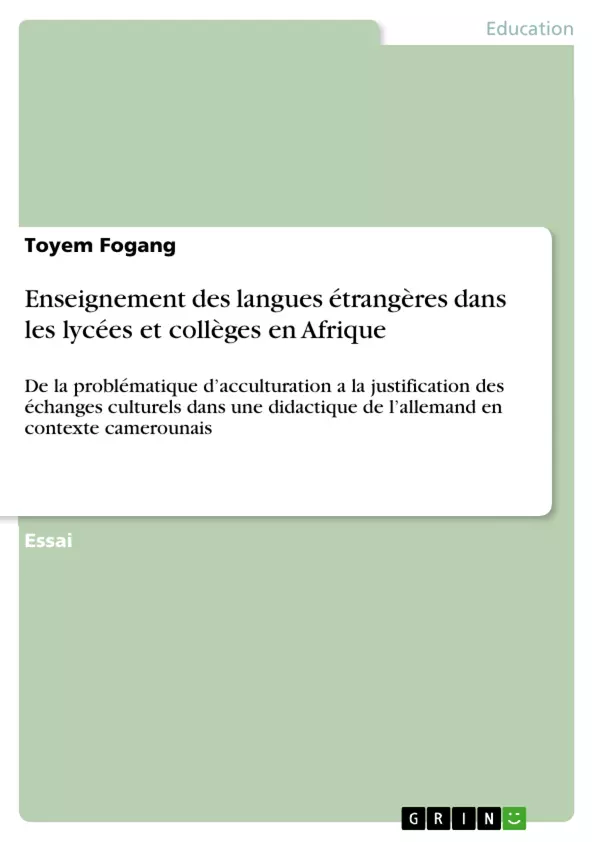Le passé colonial qui lie l'Europe à l'Afrique justifie les relations bilatérales entre le Nord et le Sud sur le plan culturel et linguistique d'où l'enseignement des langues européennes en Afrique s'avère sur-légitimé.Au moment où la philologie européenne est omniprésente dans nos universités et facultés, l'on se pose la question de savoir pourquoi étudier ou enseigner ce dernier pourtant on a l'émergence des nouvelles puissances en Asie, dont le partenariat serait un grand avantage.
Pourquoi apprendre l'Europe jusqu'à s'oublier soi-même, sa langue maternelle alors que l'Europe ne devrait pas constituer notre seul objet d'étude. D'autres proposent de prendre l'Europe de manière critique pour nous comprendre nous même et comprendre ce que l'Europe(l'Autre) pense et dit de l'Afrique(Nous).
En apprenant donc l'Allemand, l'Espagnol ou l'Anglais ce n'est plus apprendre un système de signes et de sons étrangers, et cela permet de communiquer avec d'autres cultures dans un monde plus globalisé. Dans les échanges culturelles, il s'agit de la rencontre de deux ou de plusieurs cultures où l'on apprend sur l'autre, pour un enrichissement et non pour un refus de soi. Enfin la nécessité réside sur le faite les camerounais ou bien les Africains maîtrisent d'abord leurs langues et leur littérature avant de se consacrer totalement à celle de l'Europe, pour une bonne connaissance de Soi et de l'Autre.
Questions fréquemment posées
What is the main topic discussed in this text?
The text explores the reasons for teaching European languages, specifically German, in African countries, particularly Cameroon. It also examines the potential risks of acculturation and alienation versus the benefits of cultural exchange.
Why is the presence of Europe so prominent in Cameroonian school programs?
Europe is prominent in Cameroonian curricula due to historical ties (colonization) and the colonial heritage that has made Europe a part of Cameroonian identity, language, and culture.
What does the author mean by needing to "penetrate deeply into Europe's imagination"?
The author argues that understanding Europe's perspectives and subconscious is crucial to comprehending their views on Africa and the reasons for their influence. It's about understanding their thought processes.
Why is it important to critically learn about Europe?
The text suggests that critical learning is essential to either combat or engage with Europe on equal terms. Deep understanding is necessary to avoid blind assimilation (acculturation) and to make Europe an object of strategic study.
What is the role of foreign language learning, like German, in intercultural understanding?
Foreign language learning facilitates access to another culture, enabling communication and cultural exchange. It is a dialogue between two cultures, enriching the learner's perspective.
What is the importance of being "seated" in one's own culture before learning another?
The author emphasizes that a strong foundation in one's own culture and language is essential to avoid being overwhelmed by another culture. Understanding of the "other" should complement, not replace, self-understanding.
How does "German as a Foreign Language" (Deutsch als Fremdsprache) play a role?
The concept aims to foster a fruitful dialogue between the "self" (one's own culture) and the "other" (German culture), even though this concept has faced some criticism.
What does the text say about cultural exchange and the intercultural dimension?
The text talks about the importance of encountering other cultures in language learning. The core concepts are learning about others, gaining the enrichment from those contacts.
What does the author mean by understanding Europe's "imaginaire?"
The author suggests that the learners must get to know the ways that the "European" thinks and his vision of the world.
What potential dangers does the author highlight in learning about another culture?
The author warns against learning so much about another culture (like German) that one renounces their own. It is crucial to retain and value one's own cultural identity.
What does the text say about specific teaching manuals?
The text mentions the textbook "Ihr und Wir Plus" and analyzes how it presents stereotypes and preconceptions about Africa. It emphasizes the need for learners to critically engage with these representations.
What is the ultimate goal of learning German, according to the author?
The goal is to enable learners to strengthen their own cultural roots, appropriately engage with others, and gain insights into both German culture and their own. It helps them reflect on themselves and their environment.
Questions fréquentes
Pourquoi enseigne-t-on les langues européennes en Afrique ?
L'enseignement des langues européennes est historiquement lié au passé colonial et aux relations bilatérales culturelles et linguistiques entre le Nord et le Sud.
L'apprentissage des langues européennes présente-t-il un risque d'acculturation ?
L'article pose la question de savoir si cet apprentissage mène à l'aliénation ou s'il constitue un atout pour l'échange culturel dans un monde globalisé.
Quelle est l'importance des langues maternelles selon l'auteur ?
L'auteur souligne la nécessité pour les Africains de maîtriser d'abord leurs propres langues et littératures pour une meilleure connaissance de soi avant de se consacrer à l'Europe.
Quel est le rôle de l'Europe dans les programmes scolaires camerounais ?
L'Europe est omniprésente dans les programmes multidisciplinaires, façonnant souvent le regard des chercheurs africains sur le fonctionnement du monde.
Qu'est-ce que la germanistique interculturelle mentionnée dans le texte ?
Il s'agit d'une approche de l'enseignement de l'allemand qui prend en compte les échanges et les rencontres entre différentes cultures pour un enrichissement mutuel.
- Citar trabajo
- Toyem Fogang (Autor), 2015, Enseignement des langues étrangères dans les lycées et collèges en Afrique, Múnich, GRIN Verlag, https://www.grin.com/document/335439



